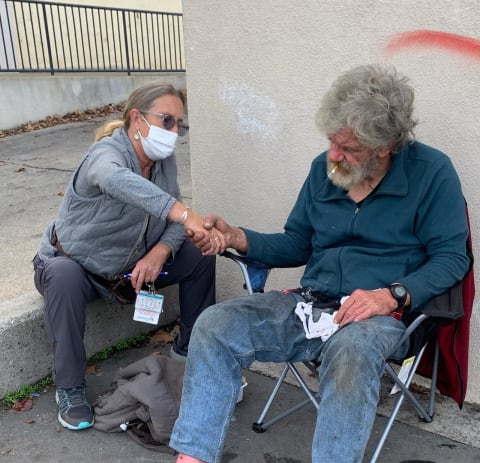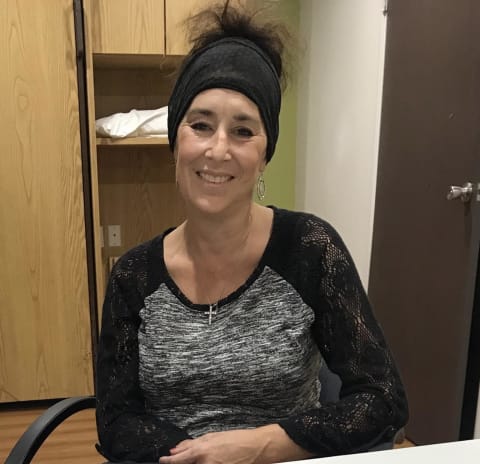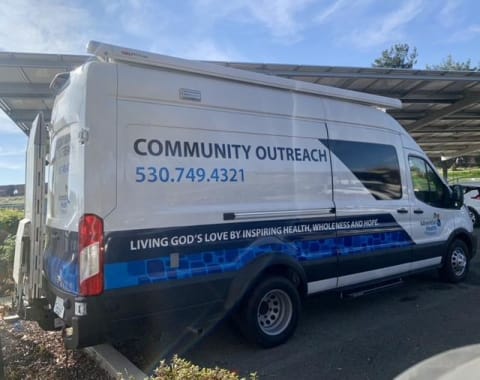
Rebuilding Lives
Story 107
While the world shut themselves inside seeking safety from the COVID-19 pandemic and hospitals around the country channeled their resources into its demands, the Street Medicine Program at Adventist Health and Rideout never stopped their daily work of outreach for the hundreds of people they care for. Since its start in 2019, the program has provided nearly 1,200 people who are experiencing homelessness with medical care, housing support, and other lifelines – and the program is continually growing to meet the needs of those they serve.

With a background in hospice and ER nursing, Cindy Cooper, RN, provides care and outreach for some of the hardest to reach people in the community, which includes connecting them to resources for ongoing help. She says her personal experience being homeless informs her work and energizes her purpose.
“Believing that these people are daughters, sons, mothers, fathers, brothers and sisters and that they deserve the care we can supply to them is a self-motivating process for me,” she says. “I help fill that need, and then there's more need, and you just keep going.”

The Street Medicine Program impacts lives across California’s Yuba-Sutter region. At the program’s inception, it consisted of one nurse and a patient care coordinator. Now, with the help of grants and other funding, it has added an additional nurse and two social workers, explains Ashten Phillips, System Director of Well-Being at Adventist Health. One social worker oversees case management activities like connecting patients to community resources, employment, transportation and more, and another helps patients transition from homelessness to either a shelter or permanent housing.
In addition, the program now has full-time, dedicated providers available through a telehealth platform. “We are able to meet people where they are, assess them, triage them and see what it is that they need or that they're missing,” says Phillips, who previously served as patient care coordinator for the program. “We also work with a pharmacy to get them the medications they need.”
This year, the program added a dedicated medical van that provides patients with privacy, a sense of safety, and transportation when necessary. “The van is also fully stocked with more supplies than one caregiver could simply carry on their backs,” Phillips explains.

“I help fill that need, and then there's more need, and you just keep going.” -Cindy Cooper, RN
To date, the Street Medicine Program has helped transition 294 people from homelessness to a shelter and 61 people into permanent housing.
“Another thing we do really well is partner with community agencies that are working to deliver care to this population,” Phillips says. These partners include crisis organizations like the Salvation Army, the Homeless Engagement And Response Team (HEART) of Sutter and Yuba Counties, and even local law enforcement. The many pressures of the pandemic highlighted the importance of these types of collaborations.
“We partnered with the Salvation Army to distribute things like Ensure, protein bars, bags and bags of hygiene products, and water,” Phillips says. “We received some grant money to purchase water by the caseloads, and during that time, we worked with the county through Project RoomKey to get individuals experiencing homelessness who were most vulnerable and susceptible to COVID-19 into hotels to assist with self-isolation.

“To have somebody see you and want to hug you and thank you, and just be glad that you're in their presence is so uplifting." -Amelia Santibanez, RN
Adventist Health runs different iterations of street nursing programs in Napa, Lake, and Mendocino counties. And with the burden of the pandemic slowly lifting, these teams have been able to get back to what they are best at – meeting the needs of the most vulnerable people in their community and forming bonds of trust that they hope will change lives for years to come.
“To have somebody see you and want to hug you and thank you, and just be glad that you're in their presence is so uplifting,” says Amelia Santibanez, RN, who provides care with the program at shelters, day centers, and other locations locally. “It makes it all worth it.”
Between the two of them, Cooper and Santibanez care for people at all stages of their homelessness experience. And although it’s uniquely challenging, they say they wouldn’t choose any other calling.
“These are people who all have their own stories and their own struggles, just like you and me,” Cooper says. “It is a real situation in life that we could all equally experience at one point or another."
Related stories

Todd Reese

Mark Mitchelson

Milad Pezeshki

Somos | "We Are"

Sarah Gutierrez

Cory Ferrier

Central Coast Service Area | Celebration Event

Mara Bryant

Camie Overton

Jayant Eldurkar

Terry Johnsson

Nursing Chose Me

Jayme Mason

Patrick Takahashi

Home again at Adventist Health White Memorial Montebello

Sarah Shelbourne

Jenny Lavers

Shane Cox

Kiyoshi Tomono
